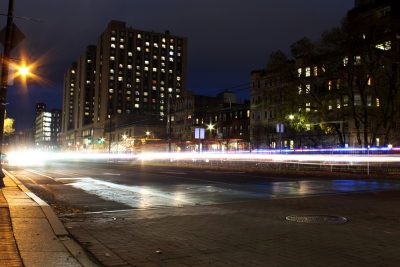
Boston University students and faculty are adjusting to the new Massachusetts stay-at-home advisory orders — which sets a 10 p.m. curfew — that took effect Friday. Some students said they wish the state was doing more to limit the spread.
Dean of Students Kenneth Elmore wrote to BU students Friday, encouraging them to abide by the latest COVID-19 guidance, including a 10-person indoor gathering capacity. Elmore cited the rising number of BU students testing positive for COVID-19 as a reason to take these new mandates seriously.
Madelynne Williams, a junior in the College of Communication and member of BU Women’s Club Ice Hockey, said the team had to reduce its number of practices from three down to one or two per week to be in compliance with state mandates. She said this frustrated her because the team works “really hard” to abide by the existing protocols.
Williams added she understands the desire to go out and partake in typical college activities, but said people need to be cognizant of the potential consequences of their choices.
“This is where I live,” Williams said. “These are the businesses that I grew up with and the area that I know, so it is close to home for me.”
Hanna Huang, a sophomore in the College of General Studies, said while students are often blamed for the spread of COVID-19, they are not the only ones who can aid in limiting the spread.
“Institutions and corporations in the U.S. are the ones that truly have the power and the most influence,” Huang said. “The focus is being put, sometimes, in the wrong places.”
Huang said the curfew is a good effort to keep people safe, but that she thinks large, daytime gatherings are the real issue. She said she would like to see more government orders for restaurants and other spaces prone to gatherings.
Elena Nestor, a sophomore in the College of Arts and Sciences, said she would prefer the state impose stricter mandates on businesses than shut them down completely.
Nestor added, however, the new restrictions make her days shorter, so she has to “cram everything in” before curfew.
Paul Hutchinson, a senior lecturer in the Questrom School of Business, said the new restrictions will lower the risk of transmission among BU students who interact with the city’s residents, because everyone will have to limit their nighttime activity.
“We’re not an island,” Hutchinson said. “What makes us safer is those around us being safer.”
Hutchinson said he is confident most BU students will take the protocols seriously because he has seen them “live up to their responsibilities.”
“There’s always going to be students who are irresponsible,” Hutchinson said, “but I think the vast majority are going to live up to what it means to be a BU student.”
Williams said these new COVID-19 restrictions have added “more anxiety” to her Thanksgiving break planning. She said she is torn between going back to her hometown of Wakefield, Mass. or staying on campus for the upcoming break.
“I don’t think a single day has gone by this week where I haven’t had to get stressed about what I’m going to do for and after Thanksgiving,” Williams said.
She added she is worried about infecting anyone if she were to contract the virus while away from school, but she would like to be with her family for the holiday.
“The idea of spending Thanksgiving alone,” Williams said, “it just sounds absolutely miserable.”
David Hamer, a professor in BU’s School of Public Health, said students should consider their family members’ health if they decide to go home for Thanksgiving.
“They need to understand that their health and that of others around them depends on their actions,” Hamer said. “For those who are thinking about going home for Thanksgiving, there’s risk of, if they’re not careful, carrying infections home to family members who may be more vulnerable.”





























































































































